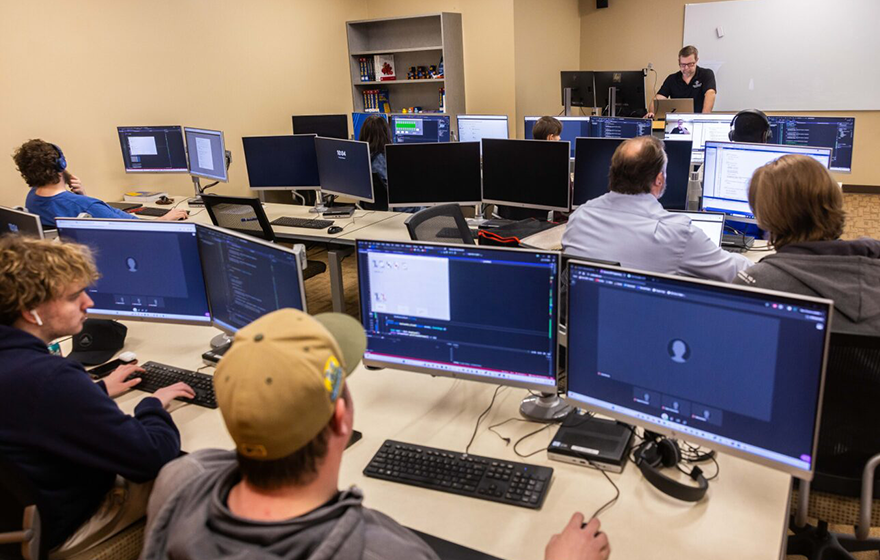Hire Dedicated Developers to Accelerate Your Software Development Timeline
Wiki Article
Dedicated Developers vs. In-House Teams: Which Is Right for You?
The choice in between using devoted developers and keeping an in-house group is a significant one that can influence the trajectory of your jobs and general service approach. Dedicated designers provide a level of flexibility and specialized experience that can be useful for details, short-term initiatives. On the other hand, in-house teams add to a natural business society and a nuanced understanding of long-lasting goals. By analyzing critical factors such as budget, task extent, and wanted control, you can better establish which strategy straightens with your organizational requirements. Nevertheless, the effects of this choice extend past instant end results-- consider the wider effect on your service landscape.Recognizing Devoted Designers
The growing demand for specialized abilities in the technology market has caused the introduction of dedicated programmers as a viable service for numerous companies. These specialists are generally gotten on a project basis, allowing companies to utilize details knowledge without the lasting commitment related to full-time hires. Devoted designers are commonly ingrained within a customer's group, giving versatility and scalability to fulfill task needs.This model permits organizations to access a global ability pool, which is particularly useful in a quickly advancing technical landscape. Dedicated developers can be sourced from various geographical areas, ensuring that companies can discover the best ability established at affordable prices. They typically bring a wide range of experience and expertise, having actually serviced diverse tasks throughout different markets.
Additionally, devoted designers can focus specifically on the jobs at hand, improving productivity and effectiveness. They are outfitted to integrate seamlessly right into existing process, collaborating closely with in-house teams to attain task goals. This method not just reduces the concern of employment and training yet also allows companies to continue to be active, adapting quickly to altering market needs and technical developments.
Benefits of In-House Teams

Furthermore, in-house groups tend to have a deeper understanding of the firm's mission, values, and goals. This positioning can boost staff member interaction and motivation, as staff member really feel extra linked to their work and the company's success. In addition, having a devoted in-house group enables far better positioning of objectives and methods, as these participants are continually concentrated on the company's top priorities.
In-house groups also assist in quicker decision-making processes, as they can react a lot more swiftly to challenges and changes. The recognized partnerships and familiarity with firm methods permit streamlined process and minimized miscommunication. Inevitably, the combination of a cohesive culture, positioning with business objectives, and reliable communication makes in-house groups a beneficial property for numerous companies, particularly those seeking to grow lasting development and advancement.
Cost Factors To Consider
When reviewing price factors to consider, both committed designers and in-house teams present distinct monetary implications for companies. Involving committed programmers generally involves a pay-per-project or per hour rate version, which can be cost-efficient for organizations with changing job demands. This method enables for versatility in scaling resources up or down, making sure that business just spend for the solutions they require.In comparison, in-house teams involve dealt with prices, consisting of incomes, benefits, and overhead costs such as office and tools. While this model provides greater control and prompt schedule of sources, it might cause greater long-term costs, particularly if the workload does not warrant a full-time team.
Additionally, firms should think about the surprise prices related to employment and training of internal workers, which can further stress budgets. In many cases, the time and sources invested in managing an in-house group can interfere with the company's core company purposes.

Task Monitoring and Adaptability
Project management and adaptability are critical elements that affect the choice between weblink internal groups and devoted designers. Dedicated teams usually have established processes for handling projects effectively, leveraging details approaches like Agile or Scrum, which help with repetitive progression and adaptability.
Eventually, the selection in between specialized developers and internal teams rests on the wanted degree of adaptability and the specific task monitoring demands. Firms must assess their operational characteristics, job intricacy, and source accessibility to identify which option lines up ideal with their calculated goals.
Making the Right Choice
Choosing the best development strategy-- in-house groups or devoted programmers-- needs a mindful evaluation of various aspects that straighten with a firm's calculated objectives. dedicated development team. Initially, consider the nature of the job. If it requires specialized abilities or a quick scale-up, dedicated designers might be better. Conversely, in-house teams can offer better connection and assimilation with existing personnel.Following, evaluate your budget plan. Dedicated developers commonly present an economical option for temporary tasks, while internal groups may sustain higher long-lasting costs because of salaries, advantages, and overhead expenses. Assess the degree of control and cooperation preferred; in-house groups normally promote stronger interaction and placement with business culture.
If prompt results are required, dedicated developers can be onboarded rapidly, whereas constructing an in-house group takes time for recruitment and training. If continuous development is vital, spending in an internal group may generate better returns over time.
Final Thought
In conclusion, the decision between internal teams and specialized developers pivots on task needs and organizational purposes. Alternatively, internal groups grow a cohesive society and deeper positioning with long-lasting goals.The choice in between using devoted developers and keeping an internal team is a substantial one that can influence the trajectory of your projects and overall business technique.Project monitoring and flexibility are vital variables that affect the selection in between committed programmers and in-house groups. dedicated development team.In contrast, internal groups might stand out in preserving a regular task monitoring framework due to their knowledge with the organization's society and long-term objectives. Devoted designers frequently provide an affordable service for temporary jobs, while check here internal teams might incur higher long-term expenses due to incomes, advantages, and overhead expenses.In final thought, the choice in between in-house groups and specialized programmers hinges on job needs and organizational objectives
Report this wiki page